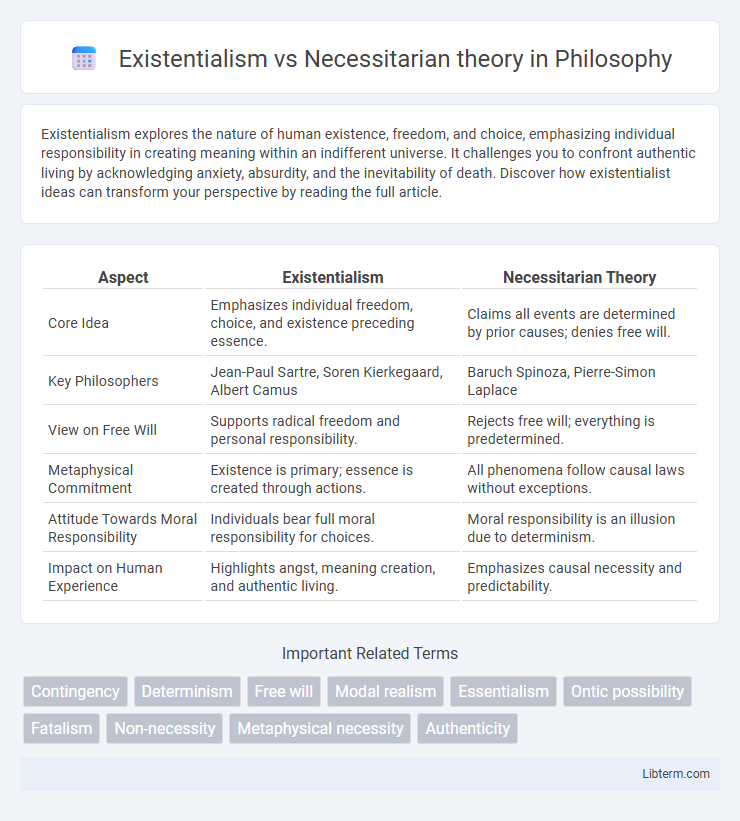Existentialism explores the nature of human existence, freedom, and choice, emphasizing individual responsibility in creating meaning within an indifferent universe. It challenges you to confront authentic living by acknowledging anxiety, absurdity, and the inevitability of death. Discover how existentialist ideas can transform your perspective by reading the full article.
Table of Comparison
| Aspect | Existentialism | Necessitarian Theory |
|---|---|---|
| Core Idea | Emphasizes individual freedom, choice, and existence preceding essence. | Claims all events are determined by prior causes; denies free will. |
| Key Philosophers | Jean-Paul Sartre, Soren Kierkegaard, Albert Camus | Baruch Spinoza, Pierre-Simon Laplace |
| View on Free Will | Supports radical freedom and personal responsibility. | Rejects free will; everything is predetermined. |
| Metaphysical Commitment | Existence is primary; essence is created through actions. | All phenomena follow causal laws without exceptions. |
| Attitude Towards Moral Responsibility | Individuals bear full moral responsibility for choices. | Moral responsibility is an illusion due to determinism. |
| Impact on Human Experience | Highlights angst, meaning creation, and authentic living. | Emphasizes causal necessity and predictability. |
Introduction to Existentialism and Necessitarian Theory
Existentialism emphasizes individual freedom, choice, and subjective experience as fundamental aspects of human existence, rejecting deterministic views that negate personal agency. Necessitarian theory argues that every event or state of affairs is necessitated by preceding causes, supporting a deterministic universe governed by causal laws. These contrasting perspectives shape debates on human freedom, responsibility, and the nature of reality in philosophy.
Historical Background of Both Philosophies
Existentialism emerged in the 19th and 20th centuries, heavily influenced by philosophers such as Soren Kierkegaard and Jean-Paul Sartre, emphasizing individual freedom, choice, and subjective experience. Necessitarian theory traces its roots back to ancient and medieval philosophers like Democritus and Baruch Spinoza, advocating that every event or state of affairs is the inevitable result of preceding causes. The historical development of existentialism centers on reactions to deterministic views, while necessitarianism is grounded in strict causal determinism and the laws of nature.
Key Concepts in Existentialism
Existentialism centers on individual freedom, choice, and the inherent meaninglessness of life, emphasizing authentic existence through personal responsibility. Key concepts include angst, despair, absurdity, and the notion that essence is defined by existence rather than predetermined traits. Unlike Necessitarian theory, which asserts that all events are determined by causal laws, existentialism advocates for radical freedom and the capacity to create one's own values.
Core Principles of Necessitarian Theory
Necessitarian Theory posits that every event or state of affairs is the inevitable outcome of preceding conditions governed by causal laws, emphasizing determinism and the absence of genuine free will. This theory asserts that all occurrences are predetermined, making human choices extensions of prior causes rather than autonomous actions. The core principles highlight a universe where necessity dictates existence, contrasting sharply with existentialism's focus on individual freedom and subjective meaning.
Fundamental Differences Between Existentialism and Necessitarianism
Existentialism emphasizes individual freedom, choice, and subjective experience, asserting that humans create their own meaning in an inherently meaningless world. Necessitarianism, in contrast, argues that all events and actions are determined by prior causes, negating true freedom and asserting a fixed, causal chain of existence. The fundamental difference lies in existentialism's focus on free will and personal responsibility versus necessitarianism's deterministic view that every outcome is inevitably prescribed by preceding conditions.
Free Will Versus Determinism in Both Theories
Existentialism emphasizes radical free will, asserting that individuals create their own essence through choices despite an inherently meaningless universe, highlighting personal responsibility and freedom. Necessitarian theory argues for determinism, claiming that every event, including human actions, is causally determined by preceding events or natural laws, thus negating genuine free will. The fundamental conflict between existentialism and necessitarianism centers on whether human agency is autonomous or constrained by an unalterable causal chain.
Influence on Modern Thought and Culture
Existentialism, emphasizing individual freedom and subjective experience, profoundly influenced modern literature, psychology, and existential psychotherapy, shaping cultural narratives around personal responsibility and authenticity. Necessitarian theory, asserting that all events are determined by preceding causes, impacted scientific determinism and philosophical debates on free will, contributing to discussions in neuroscience and legal responsibility. The interplay between these theories fosters ongoing discourse on human agency, ethics, and the nature of reality in contemporary philosophy and culture.
Major Philosophers and Their Perspectives
Existentialism, championed by philosophers such as Jean-Paul Sartre and Soren Kierkegaard, emphasizes individual freedom, choice, and subjective experience as central to human existence. In contrast, Necessitarian theory, supported by thinkers like Baruch Spinoza and Pierre-Simon Laplace, asserts that every event or state of affairs is determined by preceding causes, leaving no room for free will. Sartre's view insists on radical freedom and responsibility, while Spinoza's deterministic framework portrays human actions as manifestations of an unbreakable causal chain.
Criticisms and Counterarguments
Existentialism faces criticism for its emphasis on radical freedom, often accused of neglecting the influence of determinism and external factors on human choice, while Necessitarian theory is challenged for its rigid view that all events are predetermined, potentially undermining moral responsibility. Critics argue that existentialism's focus on subjective experience can lead to relativism, whereas Necessitarianism's deterministic framework may negate personal agency and spontaneity. Counterarguments highlight existentialism's acknowledgment of facticity and the constraints that shape but do not dictate freedom, and Necessitarian theorists propose compatibilist views reconciling determinism with meaningful autonomy.
Contemporary Relevance and Future Implications
Existentialism emphasizes individual freedom, choice, and responsibility, challenging deterministic frameworks by asserting that meaning is self-created rather than predetermined. Necessitarian theory, rooted in strict determinism, posits that all events and actions are causally determined by preceding conditions, limiting the scope of free will in philosophical and scientific discourse. Contemporary relevance lies in debates on moral accountability, artificial intelligence autonomy, and neurophilosophy, where the tension between autonomy and determinism shapes future ethical frameworks and technological advancements.
Existentialism Infographic

 libterm.com
libterm.com